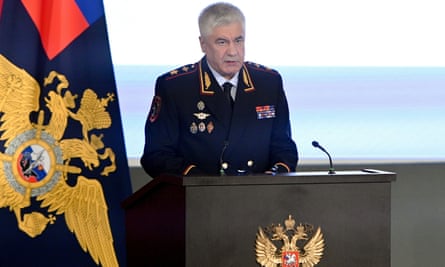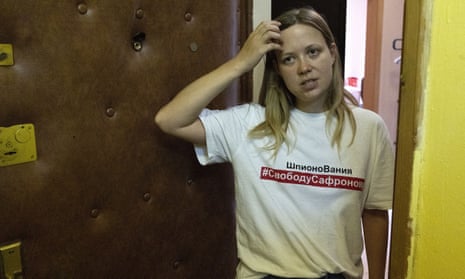Russian police have raided the apartments of several investigative journalists as they prepared to publish a report alleging that one of Vladimir Putin’s top ministers had secretly amassed a corrupt fortune.
Police detained a senior editor of the Proekt investigative website and questioned two others, including the editor-in-chief, Roman Badanin, shortly before they released a damning report on the interior minister, Vladimir Kolokoltsev. In the report, they claimed his family had amassed a real estate fortune worth nearly £18m.
Officially, the reason for the raids was a four-year-old defamation case for an article about a St Petersburg businessman. However, the crackdown on the website comes after several Proekt investigations into Putin and his close circle.
Those have included investigations into some of Putin’s most feared associates, including Chechnya head Ramzan Kadyrov and the businessman Yevgeny Prigozhin. Using leaked property and passport information, the website also contended in an article last year that Putin had a daughter from a secret mistress.

The Proekt website was offline for a short period on Tuesday morning, although the investigation into Kolokoltsev remained accessible via a video on YouTube.
“Yesterday we announced the article was coming out. This morning we get raided. It’s not even being hidden,” deputy editor Mikhail Rubin, who was briefly detained on Tuesday, told the Insider website.
The apartment of Maria Zholobova, the author of Tuesday’s investigation, was also raided, along with that of Rubin.
Badanin was named as a suspect in a defamation case for a 2017 article about a St Petersburg businessman with alleged mafia ties. The businessman was also said to be an associate of Putin.
The Russian government has launched a broad crackdown on both opposition and journalist groups that have investigated the wealth of Putin’s close aides and top ministers.
The Anti-Corruption Foundation, an investigative outfit founded by jailed opposition politician Alexei Navalny, has been declared extremist and ordered liquidated. It had alleged that Putin had been given a £1bn Black Sea palace and that prime minister Dmitry Medvedev had received gifts from wealthy oligarchs, sparking mass protests.
Other guerrilla media founded by journalists have also investigated Putin’s close family and friends. Last year, the iStories website alleged that Putin’s former son-in-law had bought shares worth approximately $380m for a pittance just months after marrying his daughter.
Although the police and the courts have crushed protest and opposition movements in Russia, the government has been unable to get a handle on the troves of Russian data that have been leaked and sold on an expansive black market.
That data has become a political nuisance and a national security liability. The Bellingcat investigative website last year used travel and mobile geolocation data for Russian law enforcement to out an FSB hit squad it said had been dispatched to kill Navalny with a novichok poison.
Similar techniques were used to identify the suspects behind the 2018 Salisbury poisonings as members of Russian military intelligence.
